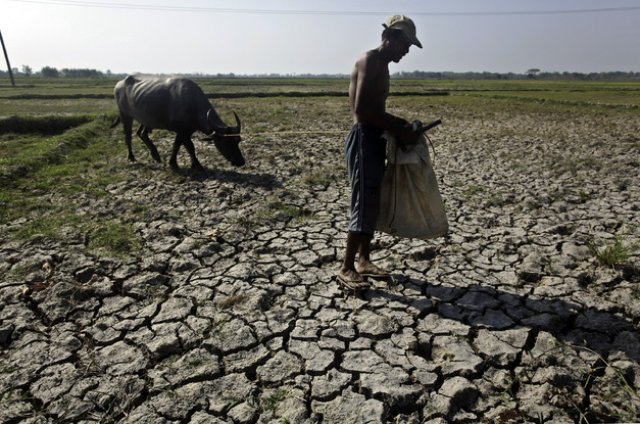
The abrupt arrival of this year's bush fire season should be taken as another warning of the urgency of tackling the climate change crisis.
The El Nino phenomenon of severe droughts and flooding rains that will make this a more dangerous summer has been a part of longstanding weather patterns on the Australian continent. But research has shown that El Nino will double in frequency and severity as global warming increases.
Entering Uncharted Waters, a new Oxfam report released on October 1 explained the global impact of the emerging “super” El Nino:
“El Nino is the name given to a periodic heating-up of the surface of the tropical Pacific Ocean, which happens as trade winds weaken and warm water that is usually confined to the western Pacific flows eastwards, away from Indonesia and towards Peru. This creates a huge release of heat into the atmosphere that influences global weather patterns.
“It is a natural phenomenon and an El Nino happens approximately every seven or eight years. These events are usually weak or moderate, but occasionally an extra-strong or 'super' El Nino happens.
“The strongest El Nino in recent times occurred in 1997–1998. This brought record global temperatures and droughts, floods and massive forest fires. It caused 2000 deaths and at least $33 billion in property damage. Scientists say that this year's event is likely to be at least on a par with these and possibly stronger than in 1997–1998.”
Oxfam estimates that at least 10 million of the world's poorest people will be facing hunger and poverty because of droughts, erratic rains and new record global temperatures.
“Disruption to maize production in both Southern Africa and Central America is driving a surge in the price of maize on local markets, making it increasingly hard for poor people to afford sufficient food.
“Over the next few months El Nino will attain maximum strength. This will coincide with the coming rains in Southern Africa, due from November. Meteorologists predict below-average rains again as a result. A second successive poor rainy season across Southern Africa will bring serious food security problems next year. The next rains in northern Ethiopia from March may also be affected.
“El Nino has also already reduced the Asian monsoon over India, and is raising the odds of a prolonged drought in East Asia, coinciding with the planting and early development of the main rice crop in Indonesia. If world prices for rice increase there could be knock-on effects on poor urban consumers in import-dependent West African countries. In Papua New Guinea, 1.8 million people have been affected by drought already and El Nino will make this worse.”
As the global human toll of the latest super El Nino is registered Green Left Weekly needs your help to build the Global People's Climate March, an important step in the construction of a movement to bring about the radical changes society has to take to face up to the climate emergency.
There are two important actions that every reader can take: 1) Help us widen our readership base by introducing Green Left Weekly to a friend, relative or workmate; 2) Ensure our project continues by making a donation.
You can make a donation today to the GLW Fighting Fund on the toll-free line at 1800 634 206 (within Australia). Donations can also be made to Green Left Weekly, Commonwealth Bank, BSB 062-006, Account no. 00901992. Alternatively, send a cheque or money order to PO Box 394, Broadway NSW 2007.
Like the article? Subscribe to Green Left now! You can also like us on Facebook and follow us on Twitter.